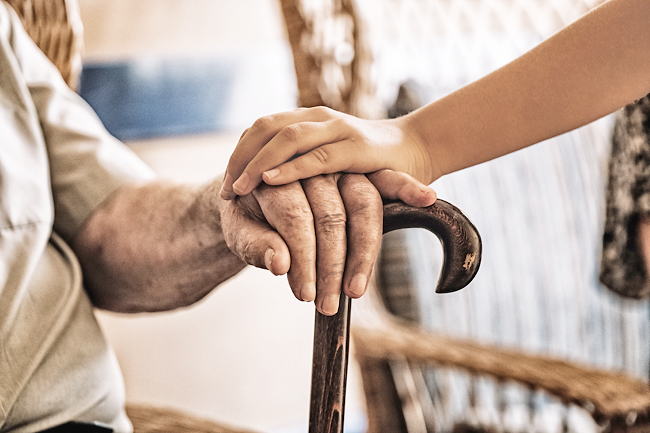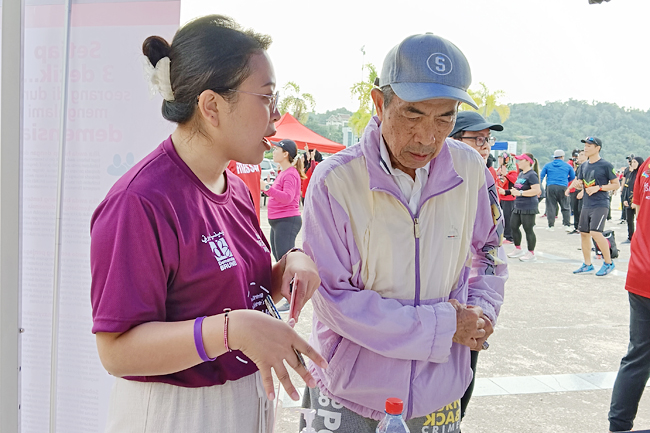Lyna Mohammad
Alzheimer’s disease and vascular dementia are the most common types of dementia – a progressive degenerative brain syndrome affecting memory, thinking, behaviour and emotion – which account for 90 per cent of dementia cases, where reports stated that someone in the world develops dementia in every three seconds.
This disease is also the leading cause of disability in older people and is the seventh leading cause of death worldwide, with the Lancet publication on the Global Burden of Disease Study 2019 having reported that there was an estimated 1,574 cases of dementia in Brunei in 2019, which will increase by 365 per cent to 7,317 cases by 2050.
In raising awareness on dementia and challenging stigma surrounding Alzheimer’s and dementia, Alzheimer’s Disease International (ADI) has established the commemmoration of World Alzheimer’s Month every September since 2012 and World Alzheimer’s Day on every September 21.
Every September, dementia associations alongside all those involved in treatment, care and support of people living with the disorder globally unite to organise advocacy and information provision events, as well as memory walks and fundraising initiatives at a global, regional, national and local level to promote dementia awareness and ways to support those living with the disease.
As a month that aims to empower people to play their part, this year’s theme ‘Know Dementia, Know Alzheimer’s’, emphasises on the power of knowledge, as knowledge is power.


Here in Brunei, the event is observed and conducted by Demensia Brunei, through conducting community screening for dementia. In conducting this activity, the organiser collaborates with the Health Promotion Centre, Ministry of Health and the Community Development Department, Ministry of Culture, Youth and Sports to conduct educational-based activities for the elderly by covering the risk factors, symptoms or warning signs of dementia and a brief cognitive assessment tool.
Demensia Brunei is also collaborating with the Pengiran Anak Puteri Rashidah Sa’adatul Bolkiah Institute of Health Sciences, Universiti Brunei Darussalam to hold a dementia care skills workshop.
ADI and global dementia associations released the World Alzheimer’s Report 2022 – Life after diagnosis: Navigating treatment, care and support, co-authored by McGill University, on World Alzheimer’s Day 2022.
The report focusses on the urgent need for significant improvements to essential post-diagnosis treatment, care and support services for the over 55 million people living with dementia across the globe and robust plans to support the forecast 139 million people by 2050.
Post-diagnosis dementia care, treatment and support refers to multiple interventions that can improve dementia patients’ quality of life. This includes both pharmacological and non-pharmacological treatments, caregiving, access to healthcare, support for daily life activities, home adaptations, social inclusion and respite.
The report also included new data showing that up to 85 per cent of the over 55 million people living with dementia around the world may not receive post-diagnosis care, while world-leading dementia experts are calling for dementia post-diagnosis, care, treatment and support to be recognised as a human right.
“There is no question whether people with cancer need treatment, so why is it that when people receive a dementia diagnosis, they’re often not offered treatment or care?” highlighted ADI CEO Paola Barbarino.
“Repeatedly, they’re just told to get their end-of-life affairs in order. Coupled with improving diagnosis rates, post-diagnosis dementia care must be recognised as a human right.”
While dementia doesn’t yet have a disease-modifying ‘cure’, Barbarino pointed out there is clear evidence that demonstrates that appropriate post-diagnosis treatment, care and support significantly improves the quality of life of those living with this disease, allowing many to maintain independence for longer.
Meanwhile, the Davos Alzheimer’s Collaborative (DAC) has awarded Demensia Brunei an early detection innovation grant, an initiative of the DAC Healthcare System Preparedness Project, aiming to advance how healthcare systems worldwide detect, diagnose, treat and care for people with or at risk of dementia.
Launched at the World Economic Forum’s (WEF) 2021 meeting on the Davos Agenda, DAC is a multi-stakeholder partnership committed to aligning stakeholders with a new vision for collective global response against the challenges Alzheimer’s presents to patients, caregivers and healthcare infrastructures.
Convened by the WEF and the Global CEO Initiative on Alzheimer’s Disease (CEOi), and fuelled by a mission of service to the estimated 150 million families and half a billion people inevitably impacted by this disease by 2050, DAC is a collaborative for the benefit of all people, in all places.
DAC Early Detection Innovation Grants are approved for organisations across the US, Brunei, Kenya, Canada, Germany, Japan, Armenia, and Cuba with projects ranging from the innovative use of new technologies and assessments, to primary care provider training programmes, to new community-based and clinical protocols for effective and efficient early identification of cognitive symptoms.
“Each grant will bring unique and measurable benefits to its local health system and community and, through DAC’s global learning network, will also spread their learnings broadly around the world,” said Founding Chairman of the Board at DAC George Vradenburg.
He added that it is paramount to find new and innovative ways to advance early detection, to improving healthcare systems’ abilities to provide better care today, and to prepare for the future availability of treatments.
The grant application process was extensive, with DAC receiving 76 responses from 21 countries within two months with a diverse panel of experts, including a family member of an Alzheimer’s patient living with the disease, serving as an independent review committee for these grants.
Out of these applications, only 12 were awarded with an early detection grant and Demensia Brunei was fortunate to be one of the grantees for the community dementia screening project in the Sultanate.
“We all need to play our part in reducing our risk for dementia, spreading the word so people are aware of the condition and seek help early if they have concerns,” said President of Demensia Brunei Dr Teo Shyh Poh.
“For those with family members and friends who have dementia, please reach out and support them as they are shouldering a heavy burden.
“Our vision is that Brunei becomes a dementia friendly community, where people with dementia and their caregivers have a better quality of life,” he added.





